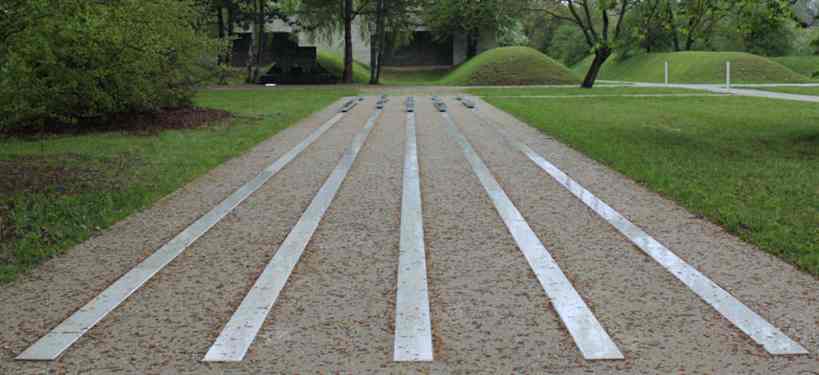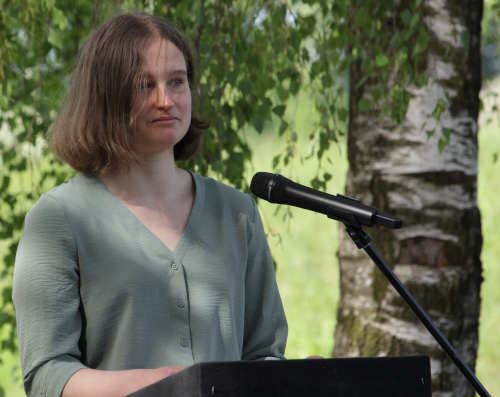Speech Carlotta Seidel ,Hebertshausen shooting range 4 May 2024
"Students often ask me how people can do such things to other people. How people can be so inhumane."
I have been doing a voluntary social year at the Max Mannheimer Study Centre in Dachau since September. When I started working there, I realised how little I had actually learned about National Socialism at school. There are many topics that were not even addressed. For example, that Soviet prisoners of war were taken to various concentration camps to be murdered there directly. That these people were never registered in the concentration camps. That only a few names are known to this day.
This place was a place of contradictions for me from the very beginning. When I was here for the first time at the end of September, the sun was shining, it was warm and I was all alone. It could almost have been beautiful. At the same time, I couldn't forget what kind of place I was in. On the site of a former SS shooting range. A place where over 4000 Soviet prisoners of war were murdered.

Over 4000 Soviet prisoners of war. It is easy to say this number and overlook what it actually means. More than 4000 people with more than 4000 different stories. So many of these stories are lost forever. And so we stand here and can almost only remember this number. Because few names are known. And yet every name is a gain. Every name makes the 4000 seem a little more tangible.

It is horrific what happened in this and so many other places. I sometimes ask myself how I should convey such horror to groups of schoolchildren. A horror that I myself cannot comprehend. Nevertheless, I often show groups this memorial site. It is another aspect of the crimes of the National Socialists and I think it is important to make the pupils realise the extent of these crimes. There was not just one place where crimes were committed, but thousands. And there were so many different people who were persecuted for different reasons. Awareness of the different groups of victims is another aspect of why it is so important to me to visit this memorial site with groups. It is a place that commemorates the murder of Soviet prisoners of war. Something that is probably not the first thing that comes to most people's minds when they think of the National Socialists.
Students often ask me how people can do such things to other people. How people can be so inhumane. I don't have an answer to this question. It's hard to imagine that people are capable of such acts. That even back then one person could murder so many other people. That there was a whole system behind it, a system that not only made this murder possible, but also encouraged it.
But that is precisely what must not be forgotten. We must not forget that people are capable of such horrific acts. We must not forget what fascism can lead to. What war can lead to. What hatred and marginalisation can lead to.
When I think about the future, I get scared. I think of all the wars that have been going on around the world for years. I also think of the shift to the right across Europe in recent years. I think of all the hatred towards other people that we encounter again and again. Hatred that is intensified by social media.
People keep saying that we have to learn from history. But I sometimes wonder whether people can really learn. When will we learn that hatred and violence don't get anyone anywhere? That everyone suffers in war? That the moment you categorise people into groups, you are not far from forgetting that we are all human? We are all human beings. People who have much more in common than differences. We should all focus on these similarities. So that no one can say that they are worth more than anyone else.
Carlotta Seidel






